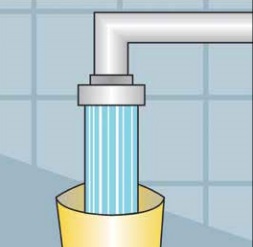The quality of your water supply can have both an immediate and a prolonged effect on the health of your household. Many Americans, especially those dependent upon well water, assume that their water is safe and healthy. Unfortunately, this is not always the case. This publication series contains basic information about home water quality and treatment.
19 publications were found in this series
-
Household Water Quality Series: Household Water Treatment: Mechanical Filtration Methods and Devices (B 1523) Mechanical filtration removes suspended solids and dirt to greatly improve the clarity of water. Various kinds of mechanical filtration methods and devices are available for home water treatments. Pri…
-
Household Water Quality Series: Household Water Treatment Techniques and Devices: Activated Carbon Filtration (B 1542) Activated carbon, also called activated charcoal, is usually produced from charcoal in granular or powdered form. It is a form of carbon that has been processed (activated) to make it highly porous, w…
-
Household Water Quality Series: Household Water Treatment: Oxidizing Filters (B 1563) Private well waters often contain high levels of iron, manganese, and hydrogen-sulfide. While these contaminants are not considered to have any human health consequences, they can cause various issues…
-
Household Water Quality Series: Lead and Copper (C 858-10) Private wells are exclusively supplied by groundwater. The source waters for most public water systems in south Georgia (and some in north Georgia) are also supplied by groundwater. Generally, lead an…
-
Household Water Quality Series: Iron and Manganese (C 858-11) Elevated levels of iron (Fe) and manganese (Mn) are two of the most common water quality problems in Georgia's groundwater. This circular addresses problems associated with high levels of these two el…
-
Household Water Quality Series: Arsenic in Your Water (C 858-12) Arsenic in your drinking water poses a threat to your health. Since private systems are more susceptible to arsenic than public water systems, private well owners should take steps to guard their heal…
-
Household Water Quality Series: Mercury in Your Water (C 858-13) Mercury in your drinking water poses a threat to your health. The U.S. Environmental Protection Agency (EPA) has set the current standard for mercury in drinking water at 2 parts per billion (ppb). Th…
-
Household Water Quality Series: Uranium in Your Water (C 858-14) Uranium in your drinking water may be harmful to your health. If your water comes from a public system, it is routinely tested to ensure safe levels of uranium. If your source of household water is a …
-
Household Water Quality Series: Removal of Hydrogen Sulfide and Sulfate (C 858-15) This publication explains how to identify and remove hydrogen sulfide and sulfate from household water.
-
Household Water Quality Series: Radon in Your Water (C 858-16) Radon is a naturally occurring, radioactive gas formed from the decay of uranium and radium found in geologic deposits. Exposure to radon gas most commonly occurs through elevated levels in home air. …
-
Household Water Quality Series: Testing for Water Quality (C 858-2) The quality and safety of drinking water is of great concern to many Americans today because of an increased interest in health and environmental quality. This new focus on water quality has led many …
-
Household Water Quality Series: Home Water Quality and Treatment (C 858-3) The quality of your water supply can have both an immediate and a prolonged effect on the health of your household. Many Americans, especially those dependent upon well water, assume that their water …
-
Household Water Quality Series: Disinfecting Your Well Water: Shock Chlorination (C 858-4) Shock chlorination is the process by which home water systems such as wells, springs, and cisterns are disinfected using household liquid bleach (or chlorine). Shock chlorination is the most widely re…
-
Household Water Quality Series: Nitrate and Nitrite in Water (C 858-5) Private well owners are responsible for the safety of their drinking water. Maintaining a healthy well requires routine testing for possible contaminants, including nitrate and nitrite. To assist in w…
-
Household Water Quality Series: Pesticides, Petroleum Products, and Other Organic Chemicals (C 858-6) Municipal water systems are required by law to be monitored for many contaminants found in pesticides, solvents, and petroleum products. However, if your water comes from a private well or from a syst…
-
Household Water Quality Series: Coliform Bacteria in Your Water (C 858-7) This publication contains information about identifying and controlling coliform bacteria in household water.
-
Household Water Quality Series: Hydrogen Sulfide and Sulfate (C 858-8) This publication describes hydrogen sulfide and sulfate and its effects on household water quality.
-
Household Water Quality Series: Corrosive or Scaling Water (C 858-9) Corrosiveness or scaling is an inherent property of some groundwater and is related to the type of rocks or sediments in contact with the groundwater. Corrosion is caused when water reacts with and di…
-
Household Water Quality Series: Protecting Your Well and Wellhead (C858-1) If you are one of the many Americans who use groundwater for drinking, the proper protection of your well and wellhead is essential for the health of your family, yourself and your neighbors. This pub…

